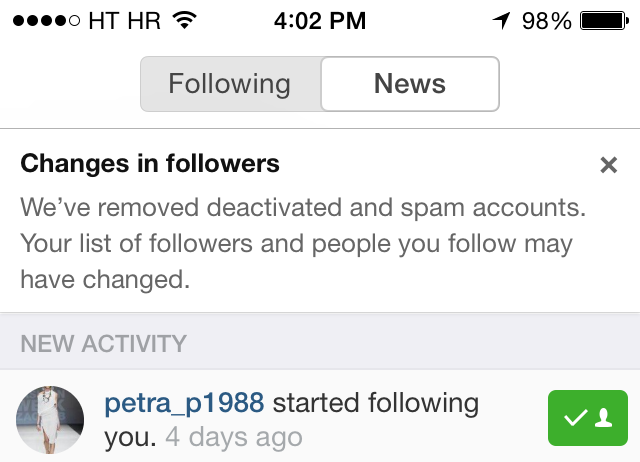Facebook-owned Instagram has responded to complaints from users who have noticed a sharp increase in the number of fake accounts and followers that are spamming them. If you fire up Instagram’s free iPhone app and hit the Following button, you’ll see a message about changes in followers.
“We’ve removed deactivated and spam accounts,” the message reads. “Your list of followers and people you follow may have changed” as a result.
This is a welcomed albeit way overdue change.
I’ve been a frequent victim of spammers on Instagram. Some of these guys are really smart in how they get on your Following list with the ultimate goal of populating your feed with spammy posts often disguised as so-called viral images and videos…
Instagram shouldn’t be a clearinghouse for viral images – other online services are far better at this. Although conceived as a mobile photography service, lately the service has become home to spammers.
And how do spammers get on your list?
Easy, a person would usually create a fake account that appears perfectly ordinary to others. Unsuspecting users then receive a follow request. Upon approving it, the account may remain ‘normal’ for some time.
But as soon as spammers accumulate enough followers, they’ll start posting images of questionable value that serve as linkbaits to shady products or promotional messages.
No service is immune to fake accounts and spammers.
Facebook, too, has a huge problem on its hands with people who frequently pollute their friends’ Timelines with low-value content. Realizing the issue won’t go away by itself, the social networking giant has changed the News Feed algorithm to fight spam.
According to Facebook, the improved algorithm will now target three kinds of posts in the News Feed: Frequently Circulated Content, Like-Bait Stories and Spammy Links.
Like-bait stores and spammy links are self-explanatory.
Chances are you’ve encountered spammy links in your News Feed where a post asks you to like, comment or share it in return for a prize or an award of sorts, all in the hope of going viral.
These like-baiting stories are on average “fifteen percent less relevant than other stories with a comparable number of likes, comments and shares,” as per Facebook.
As for Frequently Circulated Content, it involves repeated content – usually photos and videos – that gets uploaded to Facebook over and over again.
The company has found out that folks tend to find the instances of repeated content “less relevant, and are more likely to complain about the Pages that frequently post them,” said Facebook. “We are improving News Feed to de-emphasize these Pages, and our early testing shows that this change causes people to hide ten percent fewer stories from Pages overall.”
Finally, most spam posts are apparently published by Pages that deliberately game News Feed to get more distribution than they normally would.
The improved algorithm detects these stories to ensure they’re not shown more prominently in News Feed than more relevant stories from friends and other Pages.
Th change, Facebook claims, “will not impact Pages that are genuinely trying to encourage discussion among their fans.”

